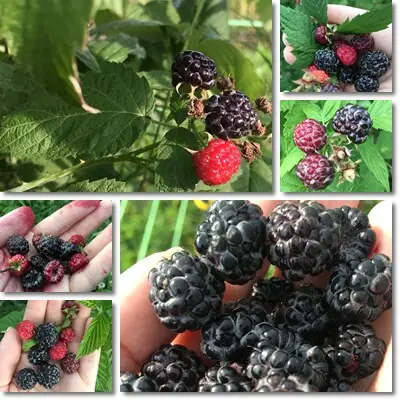Black raspberries are a naturally-occurring variety of raspberry. The two most valuable commercial species are Rubus occidentalis and Rubus leucodermis. The dark purple-blue color, which is the main attraction of the species, is provided by intensely pigmented anthocyanin antioxidants which are also an important source of health benefits. Studies show anthocyanins hold antioxidant, antimicrobial, anti-inflammatory, anti-mutagenic, anti-proliferative and blood pressure-lowering properties.
Health effects associated with consumption of the fruit include benefits for the digestive and immune systems and skin.
What are black raspberries?
Black raspberry is the common name used for the following four species of raspberry: Rubus occidentalis (from eastern North America), Rubus leucodermis (from western North America), Rubus coreanus (from Korea, Japan and China) and Rubus niveus (South Asia). They are varieties of raspberries with dark purple to black-colored fruit. Despite their somewhat unusual color, black raspberries are very real.
Plants are available for sale in nurseries and fruits can be found in supermarkets, farmer’s markets, health foods stores when they’re in season. The dark color of the fruits is a result of the presence of high amounts of pigmented anthocyanin antioxidants.

What do black raspberries look like?
Black raspberries start off green and ripen to red, then a dark red-purple and finally a very dark purple, almost black color. Each raspberry is actually made up of dozens of smaller fruits grouped together to form a bigger aggregate fruit which is what we commonly call a raspberry. Inside each of the individual fruit droplets there is a tiny, dark red-purple, but edible seed.
The stalk, also called a stem or receptacle, is easily detachable from the ripe fruit, a characteristic common to raspberries and the main difference that can help you tell apart black raspberries from blackberries.
Removing the stalk leaves a hollow in the fruits, making them look like tiny empty baskets or caps, hence the alternative names black cap, scotch cap or thimbleberry. Black raspberries have fine hairs both on the outside and on the inside of the fruit.
Naturally-occurring mutations in black raspberries have caused the gene for color to become inactive and not manifest. This has resulted in discolored fruit and given rise to the now popular golden yellow raspberry varieties. In certain circles, yellow raspberries are referred to as yellow ‘black raspberries’ to identify them as originating from black raspberry varieties.
Are black raspberries and blackberries the same thing?
Black raspberries are different from blackberries as in they are two different species of fruit. While not the same thing, the two are related species as both belong to the Rubus genus, Rosacea or rose family. The biggest difference between black raspberries and blackberries is the stalk or receptacle which is easily detachable in black raspberries, but not in blackberries.
That is, when your pick black raspberries, the stalk stays on the plant, leaving a hollow inside the fruit. This also makes it easy to harvest the fruit as they just fall off the stem when they are ripe. By comparison, blackberries don’t have a detachable stalk – there is a core left inside the fruit even if picked when perfectly ripe.
Another difference between black raspberries and blackberries is the taste. Blackberries are both sweet and tangy, with a more pregnant astringency to them, and a faint bitter aftertaste. The flavor profile is dominated by fermented fruity flavors. The taste of blackberries is quite particular and owed largely to constituents occurring naturally in the fruit called tannins. Vs blackberries, black raspberries are much more pleasant tasting in the sense that they are sweeter, with stronger fruity flavors, pleasantly sharp, but less tart than blackberries, with no bitter notes.
What do black raspberries taste like?
Black raspberries have a pleasant sweet taste, but not excessive, with a strong fruity flavor profile and scent. The sweet taste is beautifully complimented by a mild tart flavor that both balances the sweetness in the fruit and brings out the fruity flavors at the same time.
Black raspberries taste less sweet compared to yellow raspberries which lack acidity altogether and are more overtly sweet as a result. Vs red raspberries which are sharper in taste, black raspberries taste more mellow, but are more full-flavored. While red raspberries are the default raspberry flavor, mild and sharp, yellow raspberries are more on the sweeter side, while black raspberries have the best balance of flavors.
I currently have fruiting red, yellow and black raspberries in my garden and I find the black ones the most pleasant-tasting, balanced in sweetness and tartness, with a richer, more unique flavor profile.
Are wild black raspberries edible?
You can eat black raspberries from both cultivated plants and plants occurring naturally in the wild. So long as the species produces edible fruits, it doesn’t matter if the fruit comes from raspberry plants occurring naturally in the wild or growing on a farm. Edible is still edible.
Black raspberries, wild or cultivated, are perfectly safe to eat both raw and cooked or otherwise processed. You can see below a collage of images of black raspberries at different ripening stages. The pictures are of plants I currently have in my home garden. As you can see, the anthocyanins in the ripe fruit stain skin.

What are the uses of black berry?
Black raspberries have more particular uses one of which is serving as raw material for making special alcohols. Fine French liqueurs and Korean wines such as bokbunjaju use black raspberries as their star-ingredient. Fruits are also commonly used to make natural dyes which are added to food to enhance color, natural food coloring being better for health.
Fruit and seed extracts are being researched for their antioxidant, anticancer and anti-inflammatory properties. Plants are used to grow hybrid blue and purple raspberries. More conventional uses such as making preserves such as jams and jellies or use in pie fillings, fruit sauces or juice are reserved for the more readily available and inexpensive red variety.
Because they are not as popular or readily available as red or even yellow varieties, and much more expensive, black raspberries have a more modest commercial presence.
They are not commonly seen in supermarkets or even farmers’ market except maybe for when they are in season which is roughly late June or early July to mid-late August, depending on the region and yearly temperature variations. They may also be available frozen or as juice.
Nutrition facts of black raspberries
The nutritional profile of black raspberries is similar to that of other varieties of the fruit, with the exception of notable differences in antioxidant profile. The most notable nutrition facts of black raspberries include: excellent vitamin C content, generous amounts of copper and manganese, good iron, vitamin K and vitamin E content.
The species is also a good source of dietary fiber and contains moderate amounts of carbohydrates, but is low in calories and fat. B vitamins, vitamin A, calcium, magnesium, potassium and zinc are also present in small amounts.
Vs black raspberries from commercial agriculture, black raspberries sourced from the wild may have different nutrition. While the nutritional profile is roughly the same, the content of particular micronutrients may differ according to soil quality.
For example, the wild fruits may be higher in certain minerals such as copper, manganese, potassium and selenium, depending on regional soil particularities and other environment-related factors. But the amount of carbs, sugars, dietary fiber, fat and protein in black raspberries is roughly the same, as well as the energetic value.
Antioxidants in black raspberries
Black raspberries are a good source of vitamin C, vitamin E (in the seeds), copper, iron and manganese, essential nutrients with important antioxidant functions. For example, copper, iron and manganese are co-factors for the superoxide dismutase enzyme that scavenges free radicals in the body and prevents and helps repair associated cell damage.
Other antioxidants present in varying amounts in the dark colored fruits include ellagic acid, ellagitannins, quercetin and anthocyanins. The darker the fruit, the higher the anthocyanin content. In vitro studies on the anti-mutagenic and anti-proliferative properties of anthocyanins have found they have the ability to reduce tumor growth and have an inhibiting effect on cancer cell proliferation.
What are the benefits of eating black raspberries? (12 Short Answers)
How are black raspberries good for you? What benefits for health can you derive from regular consumption of the fruit?
- Benefits for digestion and constipation relief owed to good amounts of dietary fiber.
- Good food for managing hemorrhoids thanks to a generous dietary fiber and water content.
- Benefits for weight loss owed primarily to a low energetic value and a very low fat content.
- Anti-aging benefits for skin thanks to generous amounts of vitamin C which stimulates collagen production in the skin for better skin elasticity and an anti-wrinkle action and vitamin E which locks in moisture and scavenges free radicals, exerting antiaging photoprotective effects.
Note: The vitamin E in black raspberries is contained almost entirely in the seeds. - Anti-inflammatory food – anthocyanins and vitamin C in black raspberries are good for managing inflammatory conditions such as arthritis and gout.
- Immune system-boosting action and immune system regulating properties owed primarily to vitamin C and a generous content of anthocyanins and other antioxidants.
- Anticancer properties: in vitro studies show anthocyanins in black raspberries and other dark-colored fruits have anti-proliferative and anti-mutagenic properties.
- Energizing and revitalizing, the black raspberry is a good source of iron and helps combat anemia-related muscle weakness and fatigue.
- Anti-anemia action: the generous amounts of vitamin C in black raspberries help with iron absorption.
- Potential benefits for lowering cholesterol levels owed to dietary fiber and anthocyanins.
- Anti-hypertensive benefits: the lack of sodium, the small amounts of potassium and magnesium in the fruit, as well as the high anthocyanin antioxidants content help lower high blood pressure numbers.
- Other cardiovascular benefits: vitamin C and anthocyanin antioxidants in black raspberries help maintain blood vessel elasticity and improve endothelial function, further contributing to reduced risks of cardiovascular disease. Vitamin K in the fruit has an antibleeding action and anti-atherosclerotic benefits, while vitamin C has anticlotting activities.
